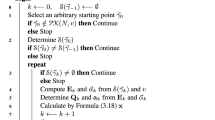Abstract
This work deals with a class of discrete-time zero-sum Markov games under a discounted optimality criterion with random state-actions-dependent discount factors of the form \(\tilde{\alpha }(x_{n},a_{n},b_{n},\xi _{n+1})\), where \(x_{n}, a_{n}, b_{n}\), and \(\xi _{n+1}\) are the state, the actions of players, and a random disturbance at time n, respectively, taking values in Borel spaces. Assuming possibly unbounded payoff, we prove the existence of a value of the game as well as a stationary pair of optimal strategies.
Similar content being viewed by others
References
Ash RB, Doléans-Dade C (2000) Probability and measure theory, 2nd edn. Academic Press, London
Bäuerle N, Rieder U (2011) Markov decision processes with applications to finance. Springer, Berlin
Carmon Y, Shwartz A (2009) Markov decision processes with exponentially representable discounting. Oper Res Lett 37(1):51–55
Cruz-Suárez H, Ilhuicatzi-Roldán R, Montes-de Oca R (2014) Markov decision processes on Borel spaces with total cost and random horizon. J Optim Theory Appl 162(1):329–346
Dutta PK, Sundaram R (1992) Markovian equilibrium in a class of stochastic games: existence theorems for discounted and undiscounted models. Econ Theory 2(2):197–214
Dynkin EB, Yushkevich AA (1979) Controlled Markov processes. Springer, Berlin
Engwerda J (2005) LQ dynamic optimization and differential games. Wiley, New York
Feinberg EA, Shwartz A (1999) Constrained dynamic programming with two discount factors: applications and an algorithm. IEEE Trans Autom Control 44(3):628–631
Filar J, Vrieze K (2012) Competitive Markov decision processes. Springer, Berlin
González-Hernández J, López-Martínez RR, Minjárez-Sosa JA (2008) Adaptive policies for stochastic systems under a randomized discounted cost criterion. Bol Soc Mat Mexicana 3(14):149–163
González-Hernández J, López-Martínez RR, Minjárez-Sosa JA (2009) Approximation, estimation and control of stochastic systems under a randomized discounted cost criterion. Kybernetika 45(5):737–754
González-Hernández J, López-Martínez RR, Minjárez-Sosa JA, Gabriel-Arguelles JR (2013) Constrained Markov control processes with randomized discounted cost criteria: occupation measures and extremal points. Risk Decis Anal 4(3):163–176
He W, Sun Y (2017) Stationary Markov perfect equilibria in discounted stochastic games. J Econ Theory 169:35–61
Hernández-Lerma O, Lasserre JB (1996) Discrete-time Markov control processes: basic optimality criteria, vol 30. Springer, Berlin
Huang Y, Guo X (2012) Constrained optimality for first passage criteria in semi-Markov decision processes. In: Hernández-Hernández D, Minjárez-Sosa JA (eds) Optimization, control, and applications of stochastic systems, systems & control: foundations & applications. Birkhauser, Boston, pp 181–202 chap. 11
Huang Y, Wei Q, Guo X (2013) Constrained Markov decision processes with first passage criteria. Ann Oper Res 206(1):197–219
Jaśkiewicz A, Nowak AS (2006) Approximation of noncooperative semi-Markov games. J Optim Theory Appl 131(1):115–134
Jaśkiewicz A, Nowak AS (2006) Zero-sum ergodic stochastic games with Feller transition probabilities. SIAM J Control Optim 45(3):773–789
Krausz A, Rieder U (1997) Markov games with incomplete information. Math Methods Oper Res 46(2):263–279
Luque-Vásquez F (2002) Zero-sum semi-Markov games in Borel spaces: discounted and average payoff. Bol Soc Mat Mexicana 8:227–241
Maitra A, Parthasarathy T (1970) On stochastic games. J Optim Theory Appl 5(4):289–300
Maschler M, Solan E, Zamir S (2013) Game theory. Cambridge University Press, Cambridge
Minjárez-Sosa JA (2015) Markov control models with unknown random state-action-dependent discount factors. Top 23(3):743–772
Minjárez-Sosa JA, Luque-Vásquez F (2008) Two person zero-sum semi-Markov games with unknown holding times distribution on one side: a discounted payoff criterion. Appl Math Optim 57(3):289–305
Minjárez-Sosa JA, Vega-Amaya O (2009) Asymptotically optimal strategies for adaptive zero-sum discounted Markov games. SIAM J Control Optim 48(3):1405–1421
Minjárez-Sosa JA, Vega-Amaya O (2013) Optimal strategies for adaptive zero-sum average Markov games. J Math Anal Appl 402(1):44–56
Neyman A, Sorin S (2003) Stochastic games and applications, vol 570. Kluwer, Dordrecht
Nowak AS (1984) On zero-sum stochastic games with general state space. I. Prob Math Stat 4(1):13–32
Nowak AS (1985) Measurable selection theorems for minimax stochastic optimization problems. SIAM J Control Optim 23(3):466–476
Nowak AS (1987) Nonrandomized strategy equilibria in noncooperative stochastic games with additive transition and reward structure. J Optim Theory Appl 52(3):429–441
Nowak AS, Szajowski K (1999) Nonzero-sum stochastic games. In: Stochastic and differential games. Annals of the international society of dynamic games, vol 4, chap 7. Springer, Berlin, pp 297–342
Osborne MJ, Rubinstein A (1994) A course in game theory. MIT Press, Cambridge
Rieder U (1991) Non-cooperative dynamic games with general utility functions. In: Raghavan TES, Ferguson TS, Parthasarathy T, Vrieze OJ (eds) Stochastic games and related topics, theory and decision library, vol 7. Springer, Berlin, pp 161–174
Schäl M (1975) Conditions for optimality in dynamic programming and for the limit of n-stage optimal policies to be optimal. Probab Theory Rel Fields 32(3):179–196
Shapley LS (1953) Stochastic games. Proc Natl Acad Sci USA 39(10):1095–1100
Shimkin N, Shwartz A (1995) Asymptotically efficient adaptive strategies in repeated games. Part I: certainty equivalence strategies. Math Oper Res 20(3):743–767
Shimkin N, Shwartz A (1996) Asymptotically efficient adaptive strategies in repeated games. Part II: asymptotic optimality. Math Oper Res 21(2):487–512
Wei Q, Guo X (2011) Markov decision processes with state-dependent discount factors and unbounded rewards/costs. Oper Res Lett 39(5):369–374
Author information
Authors and Affiliations
Corresponding author
Additional information
Work supported by Consejo Nacional de Ciencia y Tecnología (CONACYT) under Grant CB2015/254306.
Rights and permissions
About this article
Cite this article
González-Sánchez, D., Luque-Vásquez, F. & Minjárez-Sosa, J.A. Zero-Sum Markov Games with Random State-Actions-Dependent Discount Factors: Existence of Optimal Strategies. Dyn Games Appl 9, 103–121 (2019). https://doi.org/10.1007/s13235-018-0248-8
Published:
Issue Date:
DOI: https://doi.org/10.1007/s13235-018-0248-8




